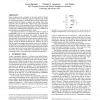41 search results - page 5 / 9 » The Correctness of Crypto Transaction Sets |
CRYPTO
2007
Springer
14 years 2 months ago
2007
Springer
Abstract. Secure multiparty computation allows a group of distrusting parties to jointly compute a (possibly randomized) function of their inputs. However, it is often the case tha...
CRYPTO
2000
Springer
14 years 26 days ago
2000
Springer
Abstract. Non-committing encryption enables the construction of multiparty computation protocols secure against an adaptive adversary in the computational setting where private cha...
ACMMSP
2006
ACM
14 years 2 months ago
2006
ACM
Open nesting provides a loophole in the strict model of atomic transactions. Moss and Hosking suggested adapting open nesting for transactional memory, and Moss and a group at Sta...
MMB
1997
Springer
14 years 20 days ago
1997
Springer
The performance of current transaction processing systems largely depends on human experts for administration and tuning. These experts have to specify a multitude of internal con...
CAV
2009
Springer
14 years 9 months ago
2009
Springer
Abstract. Pseudo-code descriptions of STMs assume sequentially consistent program execution and atomicity of high-level STM operations like read, write, and commit. These assumptio...

